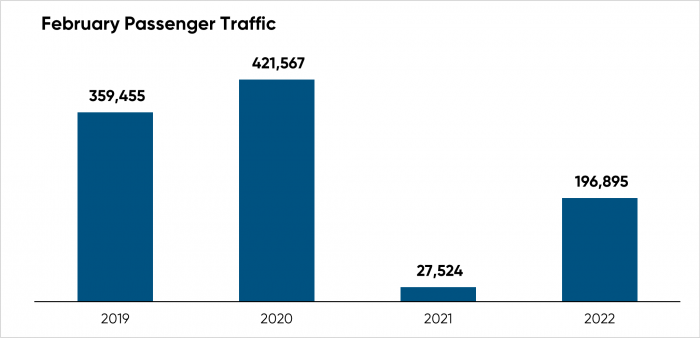Malta Airport appeals for the removal of remaining travel restrictions, as February traffic shows signs of demand-driven recovery
- February 2022 traffic grows by 24 per cent over the previous month
- Healthy SLF of 70.7 per cent indicates improved demand for travel
- The UK tops the airport’s market leaderboard
- Industry is facing new challenges arising from the war in Ukraine
Last February’s passenger traffic registered a sevenfold increase over the same month in 2021. However, traffic, which totalled 196,895 passenger movements, remained 45.2 per cent below 2019 levels.

Improved Demand for Air Travel
Over the years, Malta International Airport’s traffic for the month of February has been consistently lower or marginally better than January traffic. Last February’s traffic bucked the trend as it registered a significant increase of 24 per cent over the previous month.
This double-digit growth indicates that the easing of travel restrictions, most of which had been introduced at the end of 2021, unleashed a pent-up demand for air travel. Further indicating that this increase was driven by demand rather than improved capacity, is the drop of 3 per cent in February’s seat capacity compared to January’s.
Standing at a healthy 70.7 per cent, the seat load factor (SLF) for February was just 5.1 per cent lower than 2019 levels.
Top Markets
February saw the United Kingdom claim the top spot in Malta International Airport’s market leaderboard. From among the most popular five markets, the United Kingdom had the strongest growth rate over February 2021. Back then, stringent travel restrictions between the two countries had limited traffic from this market to just 841 passenger movements. Italy, France, Poland and Germany made up the rest of the leaderboard, with a cumulative market share of 42.3 per cent.
Industry Appeal
Airports Council International (ACI), of which Malta International Airport is a member, and the International Air Transport Association (IATA) on Friday called for the removal of all remaining COVID-19 restrictions applying to intra-EU and Schengen area travel, including testing requirements, the need to present proof of vaccination and the need to complete a Passenger Locator Form (PLF).
“Our traffic results for February clearly show that two years into the World Health Organisation’s declaration of a pandemic, people are ready to travel again. At the same time, our industry is facing a spate of new uncertainties and challenges, such as rising oil prices which are likely to push up fares, which are stemming from the war in Ukraine.
With the summer season now just weeks away, it is imperative that governments heed our industry’s appeal in relation to COVID-19 restrictions. The removal of travel restrictions would not only help boost consumer confidence, but also give industry stakeholders the confidence to invest in their businesses and be optimistic for the future at this very delicate time,” said Malta International Airport CEO Alan Borg.
Published on: 14.03.2022



